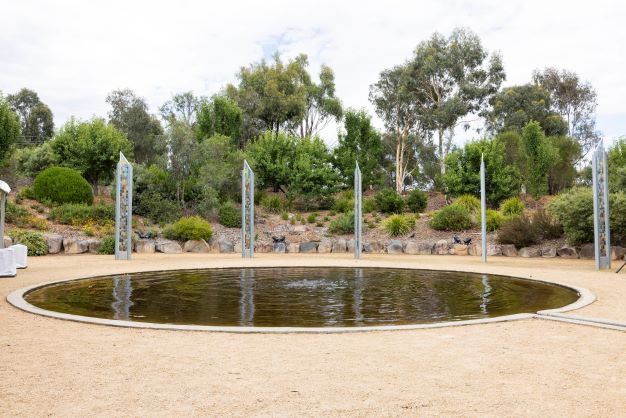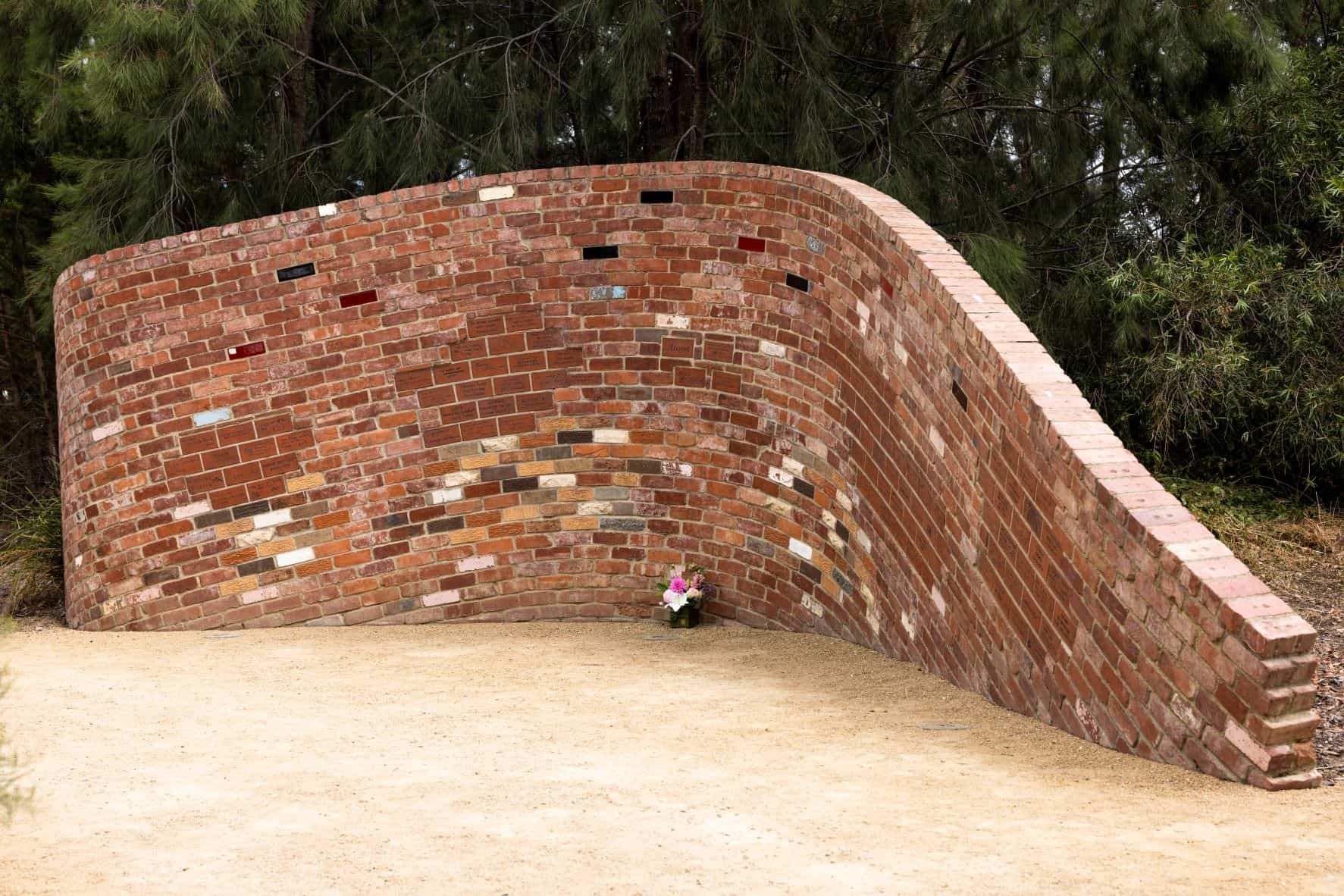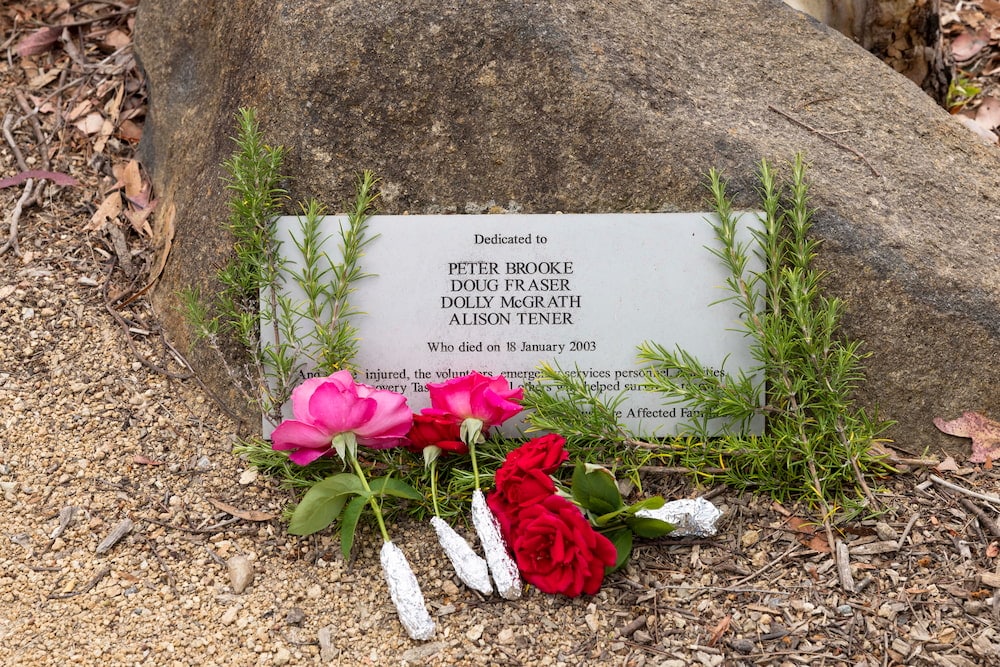On 18 January 2003, the trees in Stromlo Forest burnt like torches in the firestorm; on the top of the hill, the Stromlo Observatory blazed like a comet. Today, the park holds a Bushfire Memorial, solemn and peaceful.
The entrance is a wall made from the debris of lost homes, bricks inscribed with Canberrans’ reflections on their experience. “Lost: memories, comfort zone, home; gained: knowledge we can survive such a loss.” “A lifetime of memories gone.” “56 years of memories, our home of 30 years gone.” “Grief for loss, joy for renewal.”



One section lists the four people who died, and to whom the memorial is dedicated: Peter Brooke, Doug Fraser, Dolly McGrath, Alison Tener.
But there is also gratitude for firies, neighbours, support groups, people who comforted, people who saved homes… “Firefighters’ deeds are flowers in the garden.” “Inspirational courage and resolve.”
Acceptance, too – one inscription quotes The Rubáiyát of Omar Khayyám: “The moving finger writes; and, having writ, moves on.”
Beyond stands a grove of pine trees surrounding a sculpture: red spikes and struts, erupting out of the earth, clawing at the sky. Further on is a creek and a pool. Fire and water; fury and calm.
Here, on the 20th anniversary of the fire, families come throughout the day to remember what happened, and, perhaps, to mourn loved ones. In the distance, bagpipes skirl mournfully. Tonight, there will be a remembrance ceremony (6.30-8pm; live streamed online).
- Remembering 2003 bushfires at Canberra Bushfire Memorial (17 January)
- Canberra fire lessons yet to be learned (18 January)
It is, says Mick Gentleman, ACT Minister for Police and Emergency Services, a time for Canberra to reflect:
“To remember the lives that were lost, the properties that were lost, the incredible amount of bushland that was lost, and look at how we were able to be resilient and regrow from that particular time.”
Few who lived through that day can forget it: the smouldering sky; ashes and embers flying in the wind; everywhere smoke, and the stench of burning.
Four people died in the 2003 fires. Nearly 500 homes and 23 commercial premises were destroyed. 70 per cent of the ACT was burnt; for months afterwards, the ravaged, blackened hills of Canberra looked like a Western Front battlefield. Pets and wild animals were killed; farmers had to put down their livestock. The financial cost: $610 million; the emotional cost: ?
And yet, perhaps, good came out of that catastrophe.
“Out of the devastation of the 2003 fires, there is a lot of positives,” says Rohan Scott, chief officer of the ACT Rural Fire Service.
The community is a lot safer, and the RFS is well prepared for anything that might happen, Mr Scott states. It has better fire detection, better aviation assets, better vehicle resourcing; its volunteers are well trained; its community messaging (which did not exist in 2003) prepares the community well in advance. Fire prediction modelling and fire detection capability are better. Suburbs are better designed and houses better built. Fire is part of day-to-day living in the bush capital, but fire crews and rural land holders work all year round to reduce the risk: hazard reduction burning, strategic slashing, grazing, removing fuel loads.
“I would be very comfortable to say that if we were to have something similar, the damage won’t be as much as what it was due to those things that have happened in that 20-year period,” Mr Scott said.
The tragedy was a catalyst for change for the ACT emergency response capability, agrees Georgeina Whelan, commissioner of the ACT Emergency Services Agency.
“The tragedy of 2003 and its aftermath has left an indelible mark on the hearts and in the memories of all Canberrans, our respondents, and our first responders,” Ms Whelan said.
“It was an event that we would not wish upon anyone in any community… What was born from that experience was the basic DNA of an emergency services capability that has continued to grow and evolve based on the learnings of 2003.”
The fires brought the community closer together, too, Mr Scott believes – as recent storms and the pandemic showed.
The emergency response to the Orroral Valley bushfire, storms, and the COVID-19 pandemic showed how the ACT Government and the community implemented the lessons learnt over the last 20 years, Mr Gentleman said.
“We shouldn’t be complacent,” Mr Scott said, “but working as a collective, we will be a lot safer in any fire events that do occur in the future.”
But for Mr Scott, and for many others, the anniversary of the fires is a challenging time.
“Everyone has their own ways of dealing with it, and their own personal experiences,” he says.
Mr Scott was in Stromlo Forest, 200 metres from where the memorial now stands, when the fire front came through.
“I did feel fear from the sheer intensity of the fire, but I knew that the crew I was working with and my training set me up to be safe,” he remembers.
For all their dedication and courage, many firefighters regretted that they could not do more.
“We felt like we let the community down,” Mr Scott said. “We volunteered to protect our community; four lives [were] lost and 500 houses.
“But you look at the sheer intensity of the fire, and what actually evolved” – including a fire tornado – “there wasn’t much that we could actually do. All we did was lessen the impact.
“Whilst we lost 500 houses, we should probably look at it the other way. We probably saved a couple of thousand houses during that time.
“So there’s the two-edged sword … the great work that the firefighters did to protect property, but also the loss of life. Whilst it was tragic to have four lives lost, that could have been significantly higher.”
The firefighters’ story is told in What You Wouldn’t Believe (2003), a pictorial reflection of the fires produced by the ACT Volunteer Brigades Association.
Get local, national and world news, plus sport, entertainment, lifestyle, competitions and more delivered straight to your inbox with the Canberra Daily Daily Newsletter. Sign up here.



